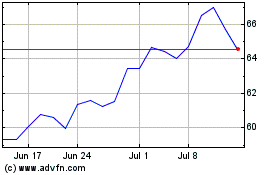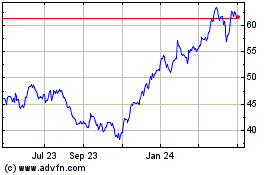By Christina Rexrode
Can a big bank have a conscience? Citigroup hired one.
David Miller is an on-call ethicist the bank consults on weighty
questions of right and wrong, supplementing its armies of lawyers
and compliance officers. A Princeton University professor by day,
Dr. Miller has worked with Citigroup intermittently for the last
three years to tackle abstract issues about banking and
morality.
Those are squishy topics for Wall Street, where aggression is a
virtue and making money a necessity. Dr. Miller, who spent years in
banking before going to seminary, acknowledges the dichotomy -- and
the ribbing from friends and colleagues who thought he had sold his
soul when he agreed to work with Citigroup.
"You need banking, just like you need pharmaceuticals," says the
60-year-old New Jersey native. "And pharma can save lives, or it
can kill and cause addictions."
If the topic is philosophical, the stakes aren't. As Citigroup's
president James Forese pointed out in a 2015 industry conference,
the bank made $1 million in revenue from dubious foreign-exchange
trading -- and paid roughly $2.5 billion in penalties.
Dr. Miller's role at Citigroup is strategic. He doesn't walk the
trading floor, hold office hours at call centers or even have an
office. Instead he reviews projects, ideas and locations where top
executives have concerns.
The bank describes his role as providing "advice and input to
senior management." His conversations with top executives like
Chief Executive Michael Corbat filter through the organization.
At a meeting with managing directors, for example, Mr. Corbat
raised an idea that came from Dr. Miller. In an uncertain
situation, Mr. Corbat said, ask the four M's: What would your
mother, your mentor, the media and -- if you're inclined -- your
maker think?
Dr. Miller also tries to get the bank to look beyond programs
such as whistleblower hotlines and compliance training to human
impulses. The problem, he adds, isn't the bad apples. Rather, it is
how easy it is for good employees to justify bad decisions when
they face gray-zone questions.
Citigroup, with a reputation for ethical problems before and
after the financial crisis, brought on Dr. Miller at the behest of
Mr. Corbat. The CEO was surprised when employee surveys found some
workers weren't comfortable escalating concerns about possible
wrongdoing.
Mr. Corbat was also motivated by the banking industry's image
problem. "If you look today at what the poll numbers say, what the
general population says, there is distrust of banks," Mr. Corbat
said in an interview.
Despite that, Dr. Miller believes banks can change. "To make the
assumption that an organization cannot be more ethical than it was
is to give up before you start," said the professor, who declined
to say how much the bank pays him. "It is not naive. It is a
realistic and necessary goal."
At Princeton, where Dr. Miller runs the university's Faith &
Work Initiative, he works from a cramped room piled with books by
John Bogle and John Calvin, Martin Luther and Martin Luther King
Jr. Posters advertise Q&As he conducted on the intersection of
faith and work with Mr. Bogle, the founder of Vanguard Group, and
former pay czar Ken Feinberg.
That wasn't always his career trajectory. As an undergraduate at
Bucknell University, he studied business and helped run fraternity
parties and a rock-concert committee. His career featured stints at
IBM, State Street and what was then Midland Securities in
London.
Dr. Miller's poise impressed colleagues at Midland, which in the
early 1990s was struggling. "You walk into a room where you would
think, 'Oh God, I can't deal with this guy, he's immaculate, he's
tall, he looks like a movie star and had this 200-watt smile," said
Richard Greensted, who worked with him at Midland. "But he was
very, very good at putting people at ease."
Dr. Miller eventually fired Mr. Greensted, who wasn't a good fit
for the bank, according to Mr. Greensted and confirmed by Dr.
Miller. The two remain friends and are still in touch.
While in London, Dr. Miller's wife, Karen, left her job as an
attorney at Skadden, Arps, Slate, Meagher & Flom LLP to teach
law and ethics at Notre Dame law school's London campus. Soon Dr.
Miller felt a similar tugging.
When he penned a letter to announce he was going to study
theology at Princeton, he was embarrassed to use the word
"calling."
"I never thought of Dave as a scholar," said Patty Hurley, a
longtime friend. "He was a sales guy, he was a people person. And
then he was learning Greek and Hebrew and he loved it."
Dr. Miller assumed he would return to finance, but ended up
pursuing a doctorate in ethics. After the Sept. 11 attacks, he
spent nine months working overnight shifts at ground zero as a
volunteer chaplain.
During his doctoral studies, Dr. Miller also began advising
senior executives. While he has worked with different companies,
Citigroup posed unusual challenges including operations in nearly
100 countries where local customs produce varying standards of
right and wrong.
Last month, Citigroup confirmed that it, along with other banks,
is being investigated over whether it improperly hired the adult
children of foreign officials in Asia -- where it can be a common
practice, but can violate U.S. laws.
The bank has embraced Dr. Miller's idea of three lenses to apply
in ethical decision-making, an approach influenced by Plato and
Aristotle: Is it right, good and fitting? Citigroup executives
composed their own three questions: Is it in our clients' interest,
does it create economic value, and is it systemically
responsible?
Citigroup is sharing the idea with employees and plans to work
it into training manuals. It is also posting the questions at its
offices around the world, including in big letters in the lobby of
its Manhattan headquarters.
Write to Christina Rexrode at christina.rexrode@wsj.com
(END) Dow Jones Newswires
March 17, 2017 05:44 ET (09:44 GMT)
Copyright (c) 2017 Dow Jones & Company, Inc.
Citigroup (NYSE:C)
Historical Stock Chart
From Mar 2024 to Apr 2024

Citigroup (NYSE:C)
Historical Stock Chart
From Apr 2023 to Apr 2024
